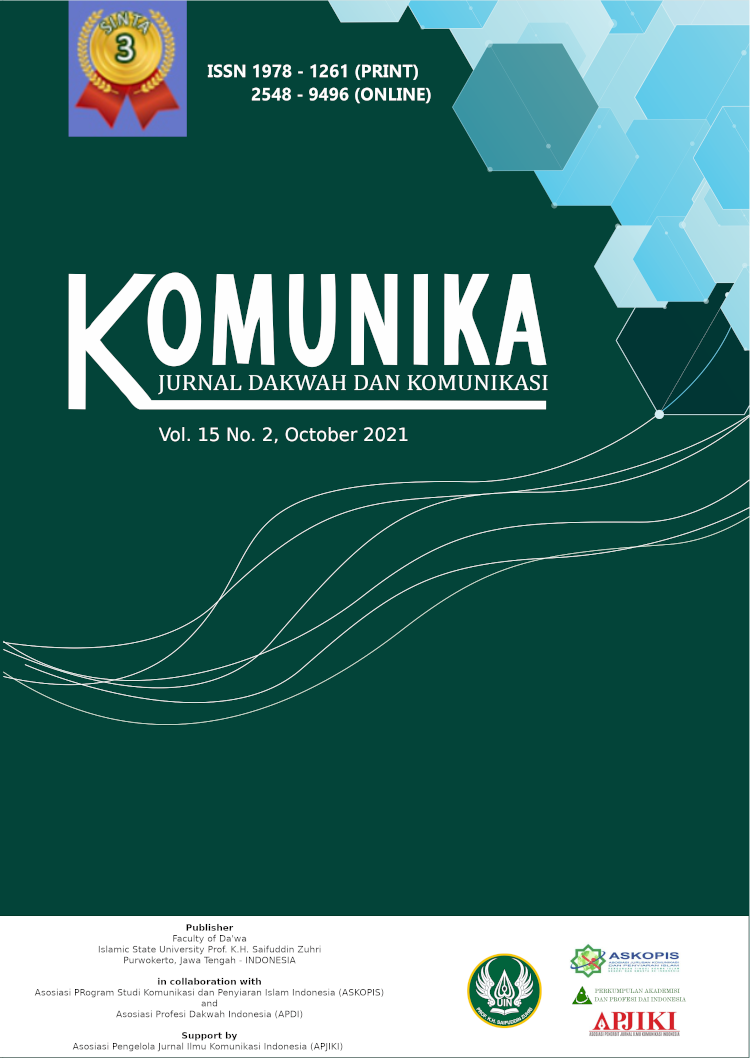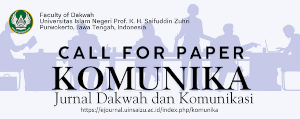Socio-Historical Study of Islamic Spiritual Institutions: Tasawuf and Tarekat Archipelago
DOI:
https://doi.org/10.24090/komunika.v15i2.10757Keywords:
socio-historical, islamic Spiritual, Tasawuf, Tarekat ArchipelagoAbstract
This article aimed to analyse this study is important and strategic to examine socio-historically the spiritual institutions of Islam: Sufism and tarekat that developed in the archipelago. The three main focus in this research are: (1). To find out how the concept of Islamic Spiritual Institutions (Sufism and tarekat) (2). To find out the historical background of Islamic Spiritual Institutions (3). To find out the development of Islamic Spiritual Institutions in the Sociological Perspective. The research method used is qualitative method with sociological approach and historical approach. The study of Development of Islamic Spiritual Institutions: Studies of Sufism and the Congregation in a Sociological Perspective was carried out with library research that sought to explore data collected through literature from various sources; books, newspapers, journals about interactions between individuals and other individuals adhering to certain tarekat related to the problem discussed. subject matter so that the data obtained from the literature can be inventoryed. The final results showed that the spread of Islam in the archipelago cannot be separated from Sufism. Even the "First Islam" which was internalized in the archipelago is actually Islam spread with Sufism. The spreaders of Islam in Indonesia are generally to Da'is who have knowledge and practice of Sufism. Among them are also many who become pangamal and spreaders of tarekat in Indonesia.Downloads
References
Atjeh, Aboebakar, Pengantar Ilmu Tarekat, (Solo: Ramadhani, 1990)
Azizy, A. Qodri M.A, Pengembangan Ilmu-Ilmu ke-Islaman, ( Jakarta:
Direktorat Perguruan Tinggi Agama Islam, Departemen Agama
RI, 2003)
Azra, Azyumardi Akar-akar Historis Pembaharuan Islam di Indonesia Neo-sufisme Abad ke 11-12 H. (Yayasan Wakaf Paramadina)
Asmaran, Pengantar Studi Tasawuf, (Jakarta: Rajawali Pers, 1996)
Bara, Antoane, The Saviour, Husain dalam Kristianitas, (Jakarta: Citra, 2007)
Dhofier, Zamakhsyari, Tradisi Pesantren. (Jakarta: LP3ES, 1982)
Gibb, H.A.R dan Kreamer(ed.), Shorter Encyclopedia of Islam, (Leiden: E.J Brill, 1961)
Hakim, Atang Ab. dan Jaih Mubarok, Metodologi Studi Islam (Bandung:
Rosda Karya, 1999)
Hamim, Toha, Faham Keagamaan Kaum Reformis, (Yogyakarta: Tiara
Wacana, 2000)
Mahmud, Abdul Halim. 2001, Tasawuf di Dunia Islam Bandung, (Pustaka Setia)
Nasution, Harun, Falsafat dan Mistisisme dalam Islam, (Jakarta: Bulan Bintang, 1992)
Noer, Deliar, Gerakan Moderen Islam di Indonesia 1900-1942, (Jakarta, LP3ES, 1994)
Solihin, dkk. 2005, Akhlak Tasawuf, (Bandung: Nuansa)
Sosrodiharjo, Soejito, Descriptive Sociology and Adat/Law Special issue, (English Edition, 1963)
Van Bruinessen, Martin, Pesantern dan Tarekat, (Bandung: Mizan, 1995)
-------, Tarekat Naqsyabandiyah di Indonesia, (Bandung: Mizan, 1994)

Downloads
Published
Issue
Section
License
Copyright (c) 2021 Hamidah Hamidah, Taufik Akhyar, Choiriyah Choiriyah

This work is licensed under a Creative Commons Attribution-ShareAlike 4.0 International License.
Authors who publish with this journal agree to the following terms:
- Authors retain copyright and grant the journal right of first publication with the work simultaneously licensed under a Creative Commons Attribution-ShareAlike 4.0 International License that allows others to share the work with an acknowledgement of the work's authorship and initial publication in this journal.
- Authors are able to enter into separate, additional contractual arrangements for the non-exclusive distribution of the journal's published version of the work (e.g., post it to an institutional repository or publish it in a book), with an acknowledgement of its initial publication in this journal.
- Authors are permitted and encouraged to post their work online (e.g., in institutional repositories or on their website) prior to and during the submission process, as it can lead to productive exchanges, as well as earlier and greater citation of published work (See The Effect of Open Access).
























